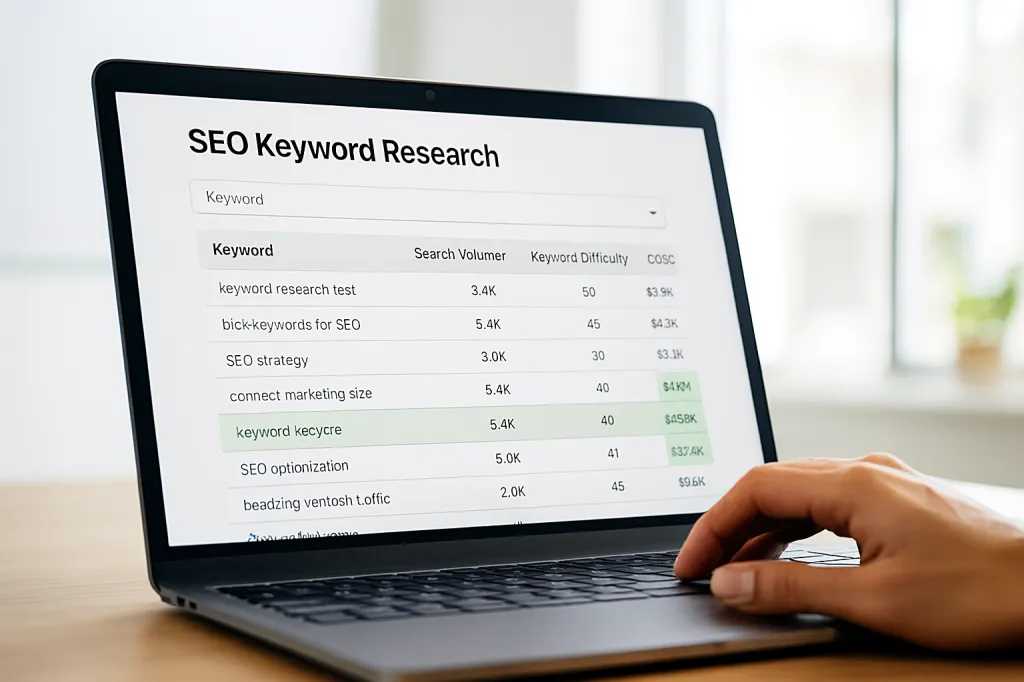In the world of Search Engine Optimization (SEO), content is king. But even the best content is useless if no one can find it. This is where keyword research comes in. It is the single most important foundation of any successful SEO strategy. Get it right, and you'll attract a steady stream of valuable traffic. Get it wrong, and you'll be writing for an audience of one: yourself.
For beginners, the term "keyword research" can sound intimidating, filled with complex metrics and expensive tools. But it doesn't have to be. This guide will demystify the process and break it down into simple, actionable steps. We'll show you how to find the exact phrases your target audience is searching for, with a special focus on identifying "high-value" keywords that can significantly boost your AdSense earnings.
What Exactly is a Keyword?
A keyword is any word or phrase that a person types into a search engine like Google. It's a direct reflection of what people are looking for. For example, "how to start a blog" is a keyword. So is "best web hosting for beginners." Your goal is to create content that matches these keywords.
Why is Keyword Research So Important?
Proper keyword research isn't just about finding words to stuff into your articles. It's about understanding your audience on a deeper level. It helps you:
- Understand Your Audience: Discover what your potential customers are struggling with, what questions they have, and what solutions they need.
- Find High-Value Content Ideas: Never run out of blog post ideas again. Keyword research provides an endless stream of topics your audience is already searching for.
- Drive Qualified Traffic: Attract visitors who are genuinely interested in your content, products, or services. This is the kind of traffic that converts and earns.
- Measure Your SEO Progress: By tracking your rankings for target keywords, you can measure the effectiveness of your SEO efforts.
Understanding Keyword Intent: The Key to "Expensive" Keywords
This is the secret to finding high-value, high-CPC (Cost Per Click) keywords. "Intent" refers to the *reason* behind a user's search query. Not all keywords are created equal. Understanding intent allows you to target users who are closer to making a purchase, which is why advertisers are willing to pay more to reach them.
There are four main types of search intent:
- Informational Intent: The user is looking for information. Keywords often start with "how to," "what is," "why," or "guide." (e.g., "how to install WordPress").
- Navigational Intent: The user wants to go to a specific website. (e.g., "Facebook login"). We usually don't target these.
- Commercial Investigation Intent: The user is planning to buy soon and is comparing options. These are very valuable keywords. (e.g., "best SEO tools," "Hostinger vs Cloudways review").
- Transactional Intent: The user is ready to buy now. These are the most valuable keywords. (e.g., "buy SEMrush subscription," "web hosting discount code").
For AdSense, targeting keywords with Commercial and Transactional intent often leads to higher-paying ads appearing on your pages, as advertisers are competing for these valuable users.
The Keyword Research Process: A 5-Step Guide
Now, let's get practical. Here is a step-by-step process anyone can follow.
Step 1: Brainstorm "Seed" Keywords
Seed keywords are the starting point of your research. They are broad, one or two-word terms that define your niche. Think about the main topics you cover.
For example, if you have a blog about website development, your seed keywords might be:
- WordPress
- Web Hosting
- SEO
- PHP Tutorial
- Website Security
Write down at least 5-10 of these main topics. These will be the seeds from which your keyword list will grow.
Step 2: Use Keyword Research Tools
Once you have your seed keywords, it's time to use tools to expand your list. These tools will show you what people are *actually* searching for related to your topics.
- Google Keyword Planner: A free tool from Google. You need a Google Ads account to use it, but you don't have to run ads. It provides keyword ideas and search volume ranges.
- Ahrefs & SEMrush: These are professional, paid tools that provide incredibly detailed data. They are the industry standard for a reason. They offer limited free versions or trials.
- Google's Free Features: Don't underestimate the power of Google itself. Type your seed keyword and look at the "People also ask" box and the "Related searches" at the bottom of the page. These are keyword goldmines.
Step 3: Analyze Your Competitors
Why start from scratch? Your competitors have already done a lot of the hard work. You can analyze their websites to see which keywords are bringing them the most traffic.
Most paid SEO tools (like Ahrefs or SEMrush) allow you to enter a competitor's domain name and see a full list of the keywords they rank for. Look for keywords where your competitors are ranking but have low-quality content. This is your opportunity to create something better and steal their traffic.
Step 4: Understand Key Keyword Metrics
When you use a keyword tool, you'll see several metrics. Here are the most important ones for beginners:
- Search Volume: The number of times a keyword is searched for per month. Higher is generally better, but even low-volume keywords can be valuable if the intent is right.
- Keyword Difficulty (KD): A score (usually 0-100) that estimates how difficult it will be to rank on the first page of Google for that keyword. As a new blog, aim for keywords with a lower KD (e.g., under 30).
- Cost Per Click (CPC): This is what advertisers are willing to pay for a single click on a Google ad for that keyword. A high CPC is a strong indicator of commercial or transactional intent. Targeting keywords with a high CPC (e.g., > $2.00) often leads to higher AdSense earnings.
Step 5: Group and Map Keywords to Content
By now, you should have a long list of potential keywords. The final step is to organize them. Group related keywords together into "clusters." Each cluster will become a single blog post.
For example, you might group these keywords together:
- "how to do keyword research" (Main keyword)
- "keyword research for beginners"
- "free keyword research tools"
- "what is keyword research"
This entire cluster can be targeted in a single, comprehensive article—the very one you are reading now! This strategy, known as creating "topic clusters," helps you build authority and rank better in Google.
Conclusion: Keyword Research is an Ongoing Process
Keyword research isn't a one-time task. It's a continuous process of discovering new opportunities and understanding how your audience's search behavior changes over time. By mastering this skill, you are laying the groundwork for a successful, traffic-driving, and profitable blog. Now, open up your favorite tool, start with your seed keywords, and uncover the high-value opportunities waiting for you.





